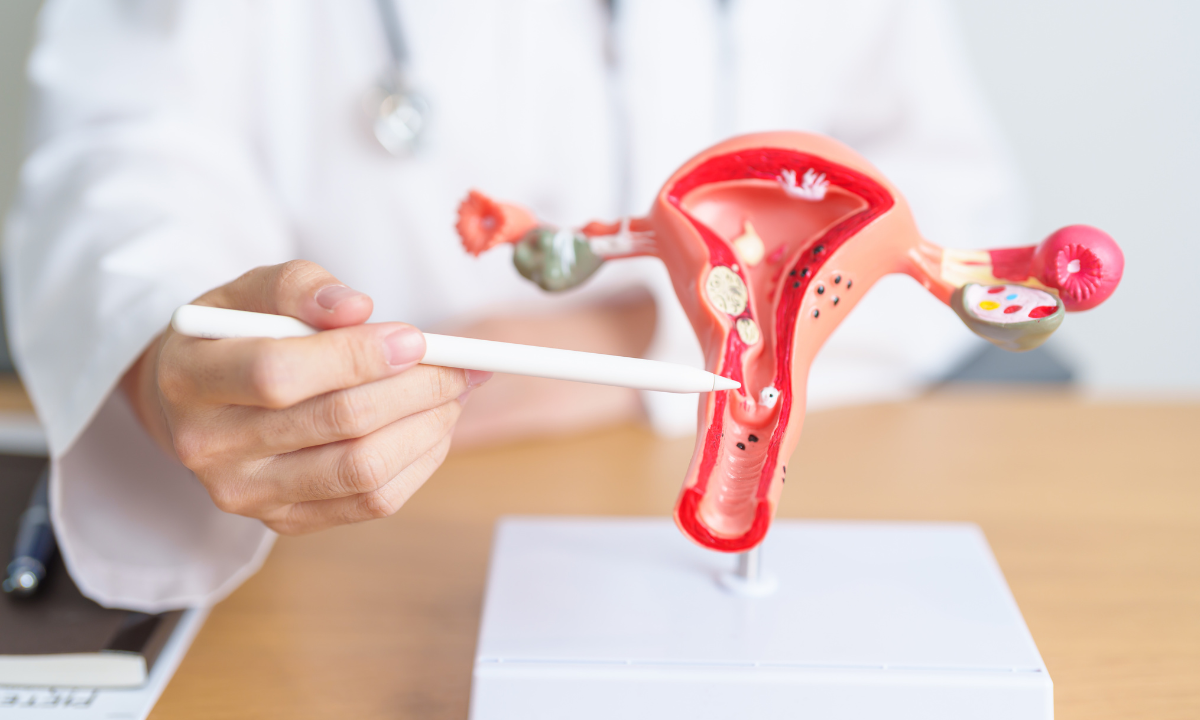Bloating is one of those feelings that might sneak up on you. It can make your stomach feel tight or full, your clothes can suddenly seem tight, or you might not want to eat. Most of the time, bloating isn't dangerous and goes away on its own.
But what if it doesn't?
For some people, ongoing bloating could mean that something is wrong with their health. It can occasionally be one of the first signs of ovarian cancer, which is commonly termed a "silent killer" since its early symptoms are vague and easy to miss. Understanding the link between ovarian cancer and bloating can help you recognise when it’s more than just passing discomfort.
What is bloating?

Bloating is a buildup of gas, fluid, or air in your digestive system, making you feel tight, full, or stretched in the area. It’s a very common experience that can be caused by simply eating too much, drinking soft drinks, or eating foods that are hard to digest, like beans or certain vegetables.
Other contributing factors may also include:
Hormonal changes:
Many women experience bloating before or during their period due to water retention and hormonal shifts.
Stress:
When you're stressed, your body releases certain hormones that can hinder the digestive process and make it harder for gas to move through your system, causing bloating.
Constipation:
When stool accumulates, it traps gas and causes pressure to build in the abdomen.
Gut-related issues:
Gut-related complications such as abdominal pain or food intolerances challenge the normal operation of the digestive system, leading to bloating, cramping, and discomfort.
Most cases of bloating are temporary and go away in a short amount of time. But when bloating becomes persistent or intense, it can be a sign of an underlying condition in your body that needs medical attention.
What is ovarian cancer?
Ovarian cancer starts in the ovaries, which are two tiny glands on either side of the uterus that make eggs and hormones like oestrogen and progesterone. It is one of the most serious women's cancers because it is often found at a later stage, when treatment is more difficult.
In the beginning, the signs of ovarian cancer are small and easy to confuse with changes in hormones, digestive problems, or getting older. But tiny changes like chronic bloating, feeling full quickly, or pelvic pain can show up months before a diagnosis.
Being aware of these small changes and getting medical help early can make a big difference. Finding it early makes treatment much more effective.
Does ovarian cancer cause bloating?

Yes. One of the most prevalent early indications of ovarian cancer is persistent bloating.
You should pay attention to how long the bloating lasts and how it feels. Bloating that is caused by nutrition, stress, or hormonal changes normally comes and goes. It usually gets better after you relieve gas, go to the toilet, or change what you eat.
Bloating from ovarian cancer feels unusual. It often:
Lasts for weeks or longer
Makes the stomach look big or hard
Creates a feeling of tightness or fullness that lasts
Comes with other issues such as pain, nausea, or a loss of appetite
In some cases, ovarian cancer can also cause unexpected weight gain, often due to fluid accumulation in the abdomen rather than increased body fat. This can make your stomach appear swollen or distended, even if your overall body weight hasn’t changed much elsewhere.
If you often think, "I feel bloated all the time," even when you're eating normally, you should see a doctor. Book an appointment with Thomson Medical today to receive evaluation and care tailored to your needs.
Why does ovarian cancer make you feel bloated?
There are several reasons why ovarian cancer can make you feel bloated:
Fluid buildup (ascites):
Cancer cells can make the lining of the abdomen inflamed, which can cause fluid to build up. This makes the stomach feel heavy and bulge.
Tumour growth:
As tumours grow, they take up space in the abdomen, which can make your belly look bigger or feel hard.
Hormonal changes:
Ovarian cancer can disrupt hormones that control digestion and metabolism, which might make you retain water or feel bloated after meals.
Inflammation:
When the immune system fights cancer, it can generate inflammation in the abdomen, which can make it swell or hurt.
All of these things might make you feel full all the time, even when you haven't eaten much.
Other early signs of ovarian cancer
Bloating doesn't happen very often by itself. Ovarian cancer can also induce a number of other subtle and long-lasting symptoms, such as:
Pain in the pelvis or abdomen
Getting full quickly when you eat
A need to urinate often or urgently
Changes in how often you go to the toilet, such as constipation
Feeling tired or weak for no reason
Weight loss or gain that happens suddenly
Pain in the lower back or stomach
It can be hard to find ovarian cancer early because these symptoms can be mistaken for digestive or hormonal problems.
Our gynae oncology specialists
Loading...
Common causes of bloating that aren't cancer
Cancer is not usually the cause of bloating. It generally has to do with more common problems like:
Eating too fast or swallowing air
Problems with digestion, like gas, constipation, or irritable bowel syndrome (IBS)
Food intolerances, particularly to dairy or gluten
Hormonal changes during your menstrual cycle or menopause
Diets high in salt, fat, or carbonated drinks
The key difference is how long and how often the bloating happens. Bloating that occurs every day usually comes and goes, but bloating caused by ovarian cancer tends to linger, worsen over time, and not respond to normal treatments.
When to go to the doctor?

If you notice any of the following signs or symptoms, you should talk to your doctor:
Bloating that doesn't go away after two or three weeks
Feeling full after eating very little
Pain in the stomach, nausea, or tiredness
Bloating that feels different from your usual pattern
Your doctor might suggest:
A pelvic exam to look for swelling or lumps
An ultrasound to check for fluid buildup or unusual growths
A blood test for CA-125, a protein that can be high in people with ovarian cancer
These tests can help determine if your symptoms are caused by ovarian cancer or something else. Even if the results are normal, it's best to rule out serious problems early.
If you experience any of these unusual symptoms, it’s best to take a medical exam to know what’s happening. You can schedule a check-up with Thomson Medical if you’d like guidance or reassurance from our doctor.
Treatment and symptom relief
If ovarian cancer is the source of your bloating, treating the cancer usually helps with the symptom. Common treatment options include:
Surgery to remove the tumour and affected tissue
Chemotherapy for ovarian cancer to eliminate any remaining cancer cells
Hormone therapy or targeted therapy, depending on the type of cancer
You can also manage discomfort while receiving treatment by:
Eating smaller meals more often
Avoiding foods that are high in sodium and carbonation
Drinking plenty of water and eating fibre-rich foods
Doing gentle exercises like yoga or walking
If you have a lot of fluid buildup (ascites), your doctor may prescribe medication or perform a minor procedure to drain the fluid and relieve the pressure.
FAQ
Is it possible for ovarian cancer to make you feel bloated all the time?
Yes, fluid buildup or tumour growth in the belly can make you feel bloated all the time if you have ovarian cancer. This kind of bloating lasts longer and doesn’t go away with normal treatments like changing your diet or taking over-the-counter medicine.
How can ovarian cancer make you feel bloated?
Your stomach may feel tight, rigid, or under pressure much of the time. Some people say they always feel full, even when they don’t eat much. You might also feel sore, have back pain, or feel full after eating just a few bites.
How long does ovarian cancer cause bloating?
Bloating from ovarian cancer can last for weeks or even months, unlike typical bloating that goes away in a day or two. If it doesn’t go away or gets worse, you should see your doctor right away.
Does ovarian cancer bloating come and go?
It can feel stronger or weaker from day to day, but it normally doesn’t go away completely. You might have good days and bad days, but the bloating usually stays the same or gradually worsens.
Is constant bloating always an indicator of ovarian cancer?
No, constant bloating not always indicate an ovarian cancer. Common causes of bloating that won't go away are usually from:
Over-consumption of salt, fat, or carbonated drinks
Hormonal changes
Digestive problems
If it lasts longer than two or three weeks or is accompanied by other symptoms like tiredness, stomach pain, or changes in urination, you should visit a doctor.
Is it possible to have ovarian cancer and not feel bloated?
Yes. Not all women with ovarian cancer experience bloating. Some people may notice other symptoms first, such as:
Pelvic pain
Changes in appetite
Irregular periods
You should get checked if you notice any long-lasting changes in your body.
Does ovarian cancer treatment make bloating go away?
Yes, most of the time. Bloating usually improves once the cancer and related fluid buildup are treated. Some people might still feel mildly bloated during recovery due to medication or digestion changes, but this typically resolves over time.
The information provided is intended for general guidance only and should not be considered medical advice. For personalised recommendations and tailored advice based on your unique situations, please consult a specialist at Thomson Medical. Request an appointment with Thomson Medical today.
References
Bloating. (n.d.). Healthdirect Australia. https://www.healthdirect.gov.au/bloating
5 Early signs of ovarian cancer. (n.d.). Rush University System for Health. https://www.rush.edu/news/5-early-signs-ovarian-cancer
For more information, contact us:
Thomson Specialists (Women's Health)
Thomson Women's Clinic (TWC)
- Novena:
6592 6686 (Call), 8611 8986 (WA) - Bukit Batok:
6569 0668 (Call), 8686 3525 (WA) - Choa Chu Kang:
6893 1227 (Call), 8282 1796 (WA) Jurong:
6262 8588 (Call), 6262 8588 (WA)- Katong (female doctor):
6970 2272 (Call), 8611 9020 (WA) - Punggol:
6243 6843 (Call), 8811 0328 (WA) - Sembawang: 6753 5228
- Sengkang: 6388 8125
- Serangoon (female doctor): 6382 3313
- Tampines: 6857 6266
- Tiong Bahru: 6276 1525
